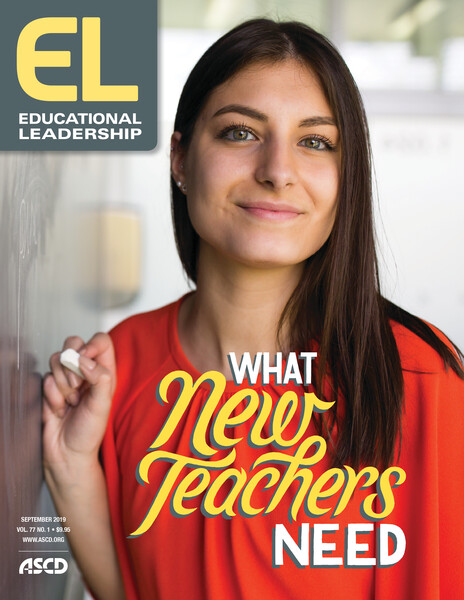Educators need to hold on to their capacity to be fascinated by students.
Hello Family! My name is Matthew R. Kay, and I am the author of Not Light, But Fire: How to Lead Meaningful Race Conversations in the Classroom (Stenhouse, 2018). I have taught English at Science Leadership Academy in Philadelphia for 13 years. I am honored to become a regular contributor to Educational Leadership, and I am especially thrilled to take over the Confronting Inequity column. I look forward to a rich, meaningful conversation with all of you. I want to start with a story about a teacher getting "caught" showing real interest in his students' lives.
In a modern teacher's life, there is perhaps nothing scarier than the prospect of going viral. Not so long ago, our classrooms were semi-private fiefdoms, where few of our mistakes stood much of a chance of being broadcast beyond the room's four walls. This relative privacy shielded teachers from the consequences of many of their actions—especially during conflicts, when it was reliably the students' word against theirs. This power dynamic, stable for centuries, has, like so many things, been disrupted by the prevalence of cell phones and the ubiquity of social media. Our modern classrooms are full of potential paparazzi, would-be journalists who can quickly, sometimes without our notice, beam video of our classrooms into a world that is not often very forgiving to teachers.
While the news media has jumped on multiple stories of bigoted teachers "losing it" in front of their classes, a recent Buzzfeed article offered a delightful counter-narrative—as well as a strong message for teachers interested in molding their classrooms into the bravest spaces they can be.
The article introduces us to a high school sociology teacher in Massachusetts named James Callahan. One day, according to one of his students, "Someone said something stupid and [Mr. Callahan] asked ‘What does that mean? It's not in my dictionary.’" This piqued his students' interest, and after a little bit of prodding, he showed them a Google Spreadsheet that sparked a wave of impressed laughter. On it, there were four pages of slang terms, side-by-side with their synonyms or definitions. For example, "slaps" translated to "of high quality," while "low-key" could be understood as "not obvious." One of his students surreptitiously snapped a few photos of his screen and tweeted them out with the message "My sociology professor keeps an alphabetic list of new slang terms he learns from students, and I will never get over it." As of this writing, the message has been retweeted more than 170,000 times.
When Buzzfeed reached out to Callahan for comment, he was effusive. "I love learning the words that their generation comes up with—both the unique ones as well as the ones where they take an existing word and give it a completely different meaning," he said. He offered an example. "When I think of ‘snack,’ I think Cheez-Its," he told Buzzfeed. "It wasn't until a month ago that I learned that an attractive person is a ‘snack.’ I'm laughing again just thinking about my students explaining it to me."
Finally, he made a point that is key for teachers. "The interesting thing is that there are many more Gen Z terms that exist but are not on the list because they aren't used anymore by teens. Almost as if they know the term and the meaning, but its usage is no longer popular, so it is not worthy of inclusion on the list." In other words, the list evolves to match shifts in his students' language.
While Callahan's list has a lot to tell us, perhaps the most important takeaway is how it went viral in the first place. He seems to not have sought attention as much as he was "caught" by his students in the act of amateur ethnography. The list was not a showpiece, an attempt to show colleagues or students how "woke" a teacher he was. Its author was its only intended audience, sparked by an authentic personal enthusiasm about his students' language and customs. After 15 years as a teacher, long after the point when many teachers adopt a distant, assembly-line view of their students, Callahan had not lost his ability to be fascinated and inspired by them. Words new to him were not ugly, or lazy, or wrong—but intriguing.
It's not hard to imagine him feeling the same way about students' ethnic names, or gender pronouns, or religious practices. If we seek to lead our students through inclusive, equity-focused instruction, we must first be genuinely interested—not publicity-seeking, faux-interested—in who they are. Students—and frankly, all of us—are more willing to engage with the tough stuff when led to it by people who openly consider their lives to be compelling.
And we can't stop learning. Callahan seems to realize what it took me years to accept—we will get older every year, while the students before us stay the same age, year after year. Just as software requires frequent updates, so too does our familiarity with students' cultures and shifting identities. Ground gained last year is not necessarily ground held this year—and woe to the teacher who leans too heavily on last year's understandings. Callahan's habit of revising his list marks a humility worth striving for. His pruning of words as they fall out of favor signals that he has never stopped listening to his students.
We need to keep the example of Callahan's humble willingness to update his list in mind. It's especially hard for teachers who have long-developed reputations for being culturally responsive to accept that current students might not see us that way. But things change. For example, stories gleaned from a Bosnian student in the 1990s might be useful, but they don't make me an expert on the experiences of a Central American asylum seeker in 2019.
Our students' lives will always be the most important target of our inquiry, and we must never accept a static understanding of who they are, where they come from, or where they want to go. Instead, we must ask, as Callahan did—knowing that our questions might look silly and that our students' stories might surprise us, inspire us, or even devastate us. But it's ultimately not about how our inquiry makes us feel. It's about developing substantive, honest relationships with our students, so that we can trust each other in the work that lies ahead.
End Notes
•1 Chen, T. (2019, May 3). "A 43-year-old high school teacher has been keeping a personal list of ‘Gen Z’ slang terms he overhears his students using." Buzzfeed.





